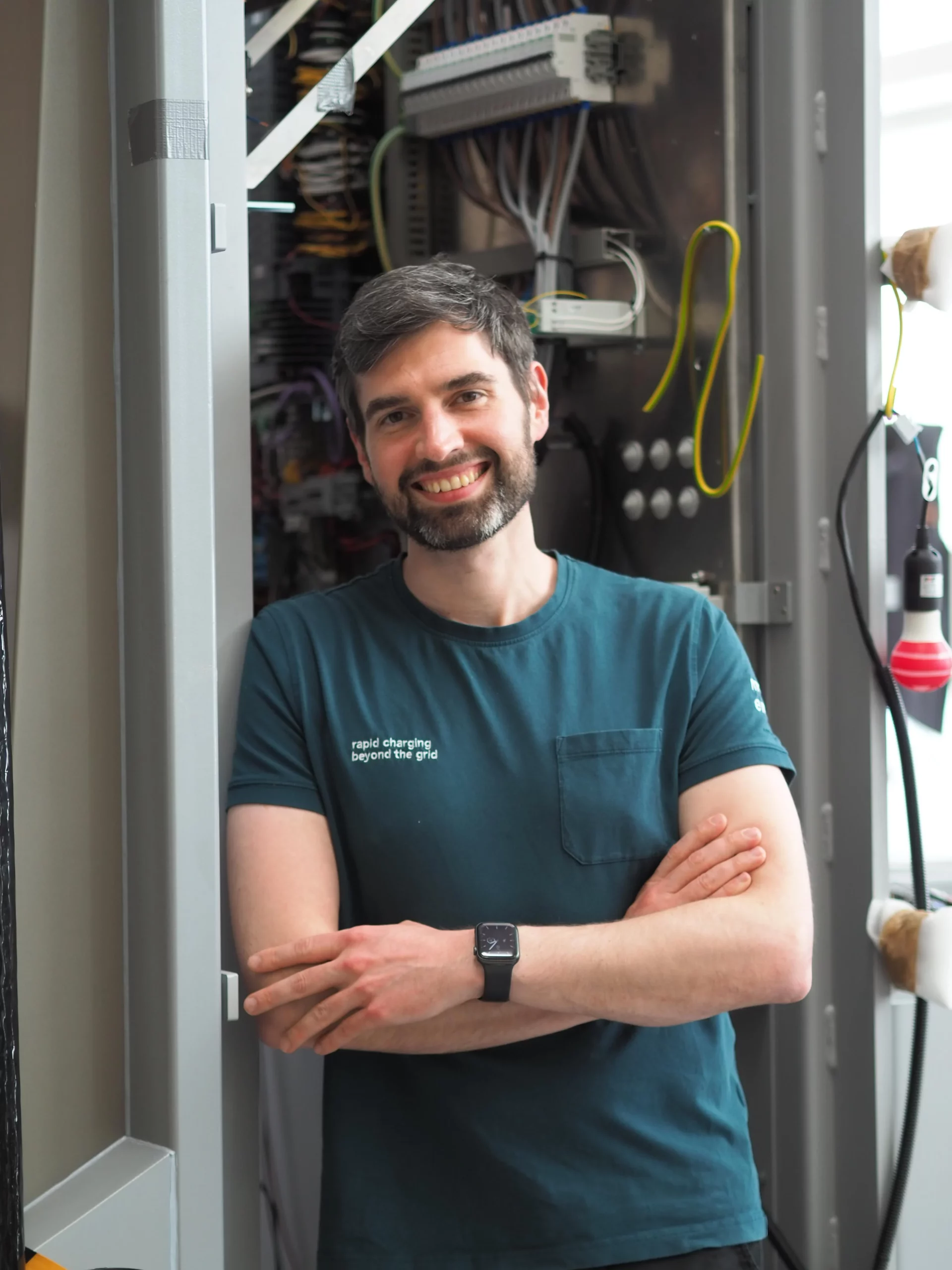 Alexander Sohl, Start-up-Gründer und Geschäftsführer. Foto: Me energy
Alexander Sohl, Start-up-Gründer und Geschäftsführer. Foto: Me energy
Since 2019, Alexander Sohl and Inès Adler have been working on making electromobility independent and easy to use for everyone. With the Rapid Charger 150, me energy is the first provider of fast charging stations that are completely independent of the power grid and at the same time CO2-neutral. The start-up has been based in Wildau near Berlin since July 2019 and entered the market in July 2020. 28 employees are currently working on the development, production and servicing of the rapid charging station.
In an interview for the current eMove360° magazine in german language, the founder explains how he came up with the idea of developing the Rapid Charger, why the power grid needs to be massively expanded and where the biggest challenges of the mobility transition lie.
Who are you and what do you do?
Alexander Sohl: I’m Alex, founder and Managing Director of me energy. At me energy, we are trying to do our bit to ensure that we only generate and travel with sustainable energy in the future. We do this with off-grid fast charging stations that are able to generate their own electricity. In other words, a contribution to electromobility.
How did you come up with the idea of developing a mobile fast-charging station?
Sohl: In 2015, I was traveling long distances in an electric car for the first time and at that time there were hardly any charging stations and even fewer fast charging stations. When I arrived at the planned charging stop, the fast charging station was out of order. I had to look for an alternative and asked the local residents if I could charge at their home socket. At the time, I felt like an alien. During the 8 hours of charging that followed, I had enough time to think about why charging stations are often not available and what problems we have installing them. The bottom line: the power grid is often unable to supply the large amounts of electricity. To charge a Tesla quickly, you need about the same amount of electricity as 50-70 households.
What values in the company are important to you?
Sohl: I think everything you say here sounds trite. But I try to be a role model myself and live the values of transparency, openness and honesty. I also want to be approachable for everyone at all times and not lose touch with the word creation and the customers. The new German term for this is customer-centric.
What goals are you pursuing with me energy?
Sohl: To make a contribution to the energy and mobility transition. My goal is that in five years’ time, we will no longer have to think about whether our next car will be an electric or combustion engine car, but will choose an electric car voluntarily and not because of political requirements.
Me energy has already won several prizes – which one were you particularly pleased about and why?
Sohl: All the prizes were of course very nice. But we were particularly pleased with the prizes at the beginning, the StartGreen Award and the four awards at the Business Plan Competition. In this phase, which is characterized by uncertainty, prizes are particularly valuable as they give the idea visibility and confirmation.
Where do you see the biggest challenges in the mobility transition in Germany?
Sohl: Clearly the charging infrastructure, especially the fast-charging infrastructure. Because the big challenge still awaits us. While we are already failing with charging stations for cars, commercial vehicles present us with much greater challenges. To exaggerate a little: Today’s fast charging station is the wallbox for trucks.
What needs to happen to solve the problem?
Sohl: Perhaps it’s strange to hear this coming from me, but the electricity grid needs to be massively expanded. This requires political will and understanding among the population. The dimensions are almost unimaginable. Everyone is talking about major routes such as “Südlink”, but the big challenge is actually the distribution grid at the low-voltage level. We need massive new capacities here. Almost every street has to be torn up and new lines laid. So it’s a mammoth task, much bigger than the expansion of fiber optics.
What makes you confident about the future?
Sohl: The developments of the last few years. Whereas three years ago, I was still having to debate the fundamental sense of electric cars, today the question is more: when will I make the switch and is there already a suitable model for me?
How and where can you really switch off?
Sohl: Doing sport, whether it’s skiing, hiking or swimming. Anyone who has ever skied down a mountain at 80 km/h quickly realizes that you don’t have too much time to think about anything else.
Which 3 books have influenced you the most?
Sohl: The ones that come to mind immediately, at least for me: Homo Deus (Yuval Harari), Capital in the 21st Century (Thomas Piketty) and to name something else positive Humankind (Rutger Bregman)